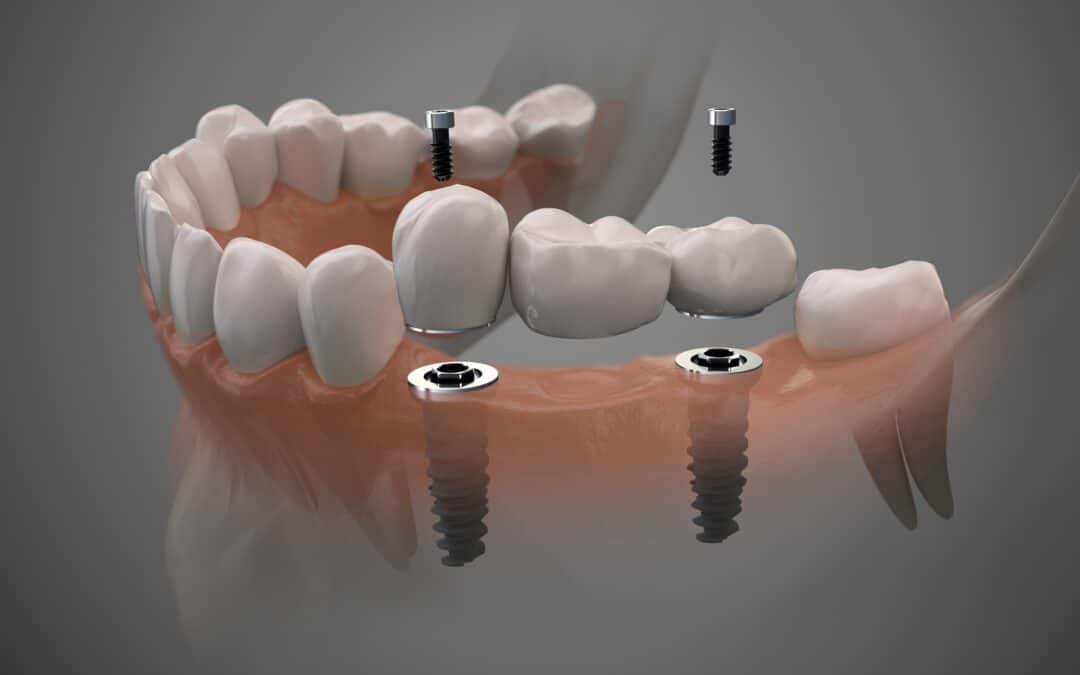Many people are under the impression that modern dentures still look clunky and awkward. And while many people still use dentures like this to give them a full set of teeth, there have been plenty of advances in denture technology in recent years.
So today, we’re going to talk about modern dentures. What new features are available in dentures? What are some of the problems with dentures that modern solutions have fixed? Let’s get to answering these questions and more.
What Are the Downsides of Traditional Dentures?
Dentures are an effective dental option that has been around for centuries. George Washington famously wore a set of false teeth, but dentures have been around even longer than that. But this dental technology is far from perfect, even though it’s been around for so long.
The Materials
Dentures have been made of several different materials over the years, from ivory to metal and even wood. But more famously, and more recently, dentures have been made out of porcelain.
Porcelain is a great material for dentures. It’s strong and durable, its color resembles the color of teeth, and it’s more resistant to stains than many other materials. Many people probably still think that dentures are made from porcelain, but modern technology has brought us a new material that is a little more suited for dentures: acrylic resin.
Today, most dentures are made with acrylic resin. It’s a strong enough material to handle the day-to-day chewing that your false teeth need to handle. But it’s a bit more malleable than brittle porcelain.
This allows it to be adjusted more easily, in the case that your mouth changes slightly over time, and it’s less fragile, so your dentures won’t break as easily if you drop them.
The Fit
Of course, one of the main problems with traditional dentures is that they’re not always going to fit perfectly. Most dentures rely on a perfect mold to your gums and a bit of suction to stay put in your mouth all day long. Lots of people also use denture adhesive to secure the denture to their gums.
But even this can leave plenty to be desired. Your dentures can still fall out of place. It may seem at first glance like it isn’t that big of a deal, but it changes a lot about your mouth.
If your dentures are constantly at risk of falling out, you have to change the way you talk, the way you chew, and even the way you smile. Your muscles have to adapt to having a loose set of teeth. The learning curve can be tough, and even then, you might find yourself biting your cheek often or even having your dentures fall out.
Your Health
Lastly, traditional dentures fail to correct some of the health problems that come from not having any teeth.
Being toothless poses health risks. Of course, there’s the factor of nutrition. People without teeth may have to severely restrict their diet, which can lead to numerous health problems and exacerbate existing ones. Getting a pair of dentures can help to fix that.
But one of the health problems that is overlooked by traditional dentures is jaw bone atrophy. Your natural teeth are anchored deep into your gums into the bone that rests there. So when you chew, your teeth stimulate the muscle and bones in your jaw.
Without teeth, your muscles and bones don’t get that necessary stimulation, and they can atrophy. This can lead to jaw bone loss, which can be quite painful, increase your risk of gum disease, and even affect the structure of your face. Traditional dentures don’t do anything to prevent this.
What Are Some Modern Innovations in Denture Technology?
Luckily, denture technology has come a long way in recent years. As we’ve discussed, materials have been upgraded to fit your needs better. But more importantly, we’ve come up with solutions for the problems with fit and the health problems that edentulous people are at risk for.
That solution could be anchored dentures.
What Are Anchored Dentures?
Anchored dentures, also called implant-supported dentures, use the power of dental implants to solve the problems that traditional dentures pose. Essentially, dental implants are surgically installed into your gums. They anchor into the bone in your jaw and come out of the tops of your gums.
Then, the dentures are created which can snap onto the implants, giving the dentures a very secure fit without the use of adhesives. Now, you don’t have to worry about your dentures falling out because they are securely attached to your implants. No more shifty false teeth making your life difficult.
Not only that, but dental implants help to protect your health by reducing your risk of some of the problems that edentulous people face. Because the dental implants anchor to the bone in your mouth, chewing will still provide the stimulation that your muscles and bones need to stay strong.
This means you’re at a much lower risk of developing bone atrophy. Dental implants go a long way toward keeping your mouth healthy as it should be.
A Modern Solution With Renew
There are about 36 million Americans that don’t have any teeth. That’s over 10% of the population. These people need solutions to their health problems, and modern innovative technology has delivered.
If you’re interested in anchored dentures and want a free consultation, visit Renew Anchored Dentures to learn more.
Sources:
Facts & Figures | American College of Prosthodontists
What are dentures made of? | Authority Dental
What is bone atrophy? | International Congress of Oral Implantologists
